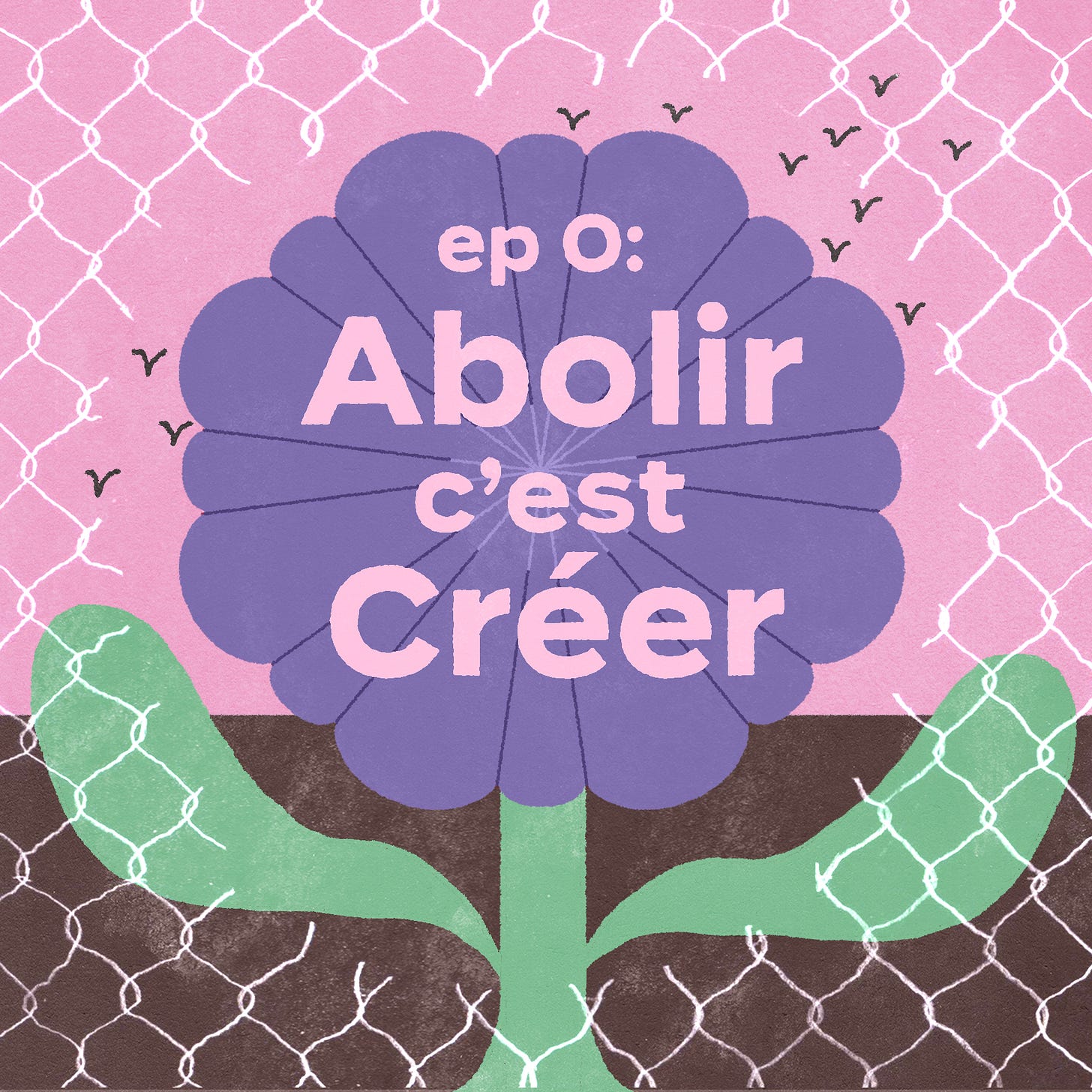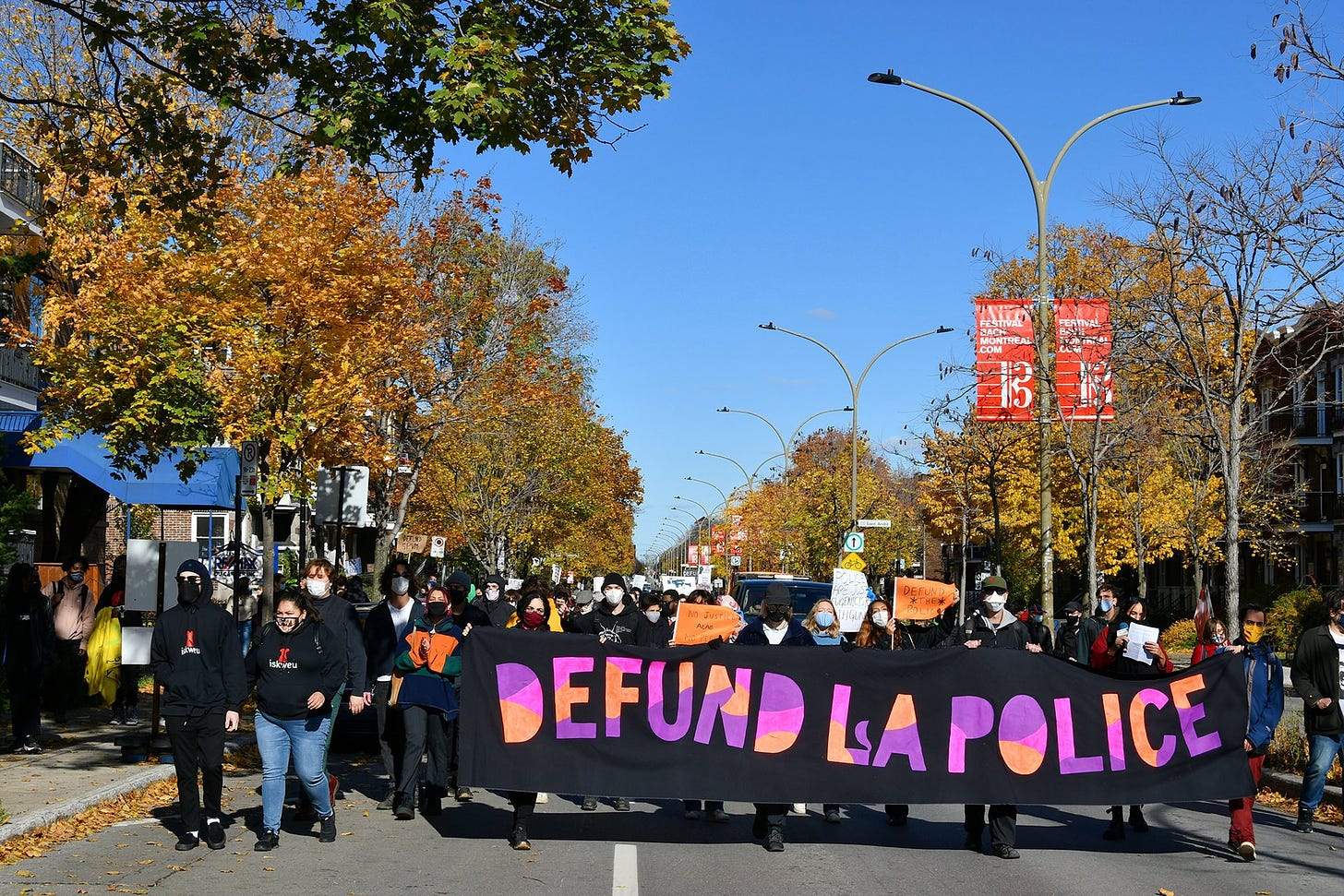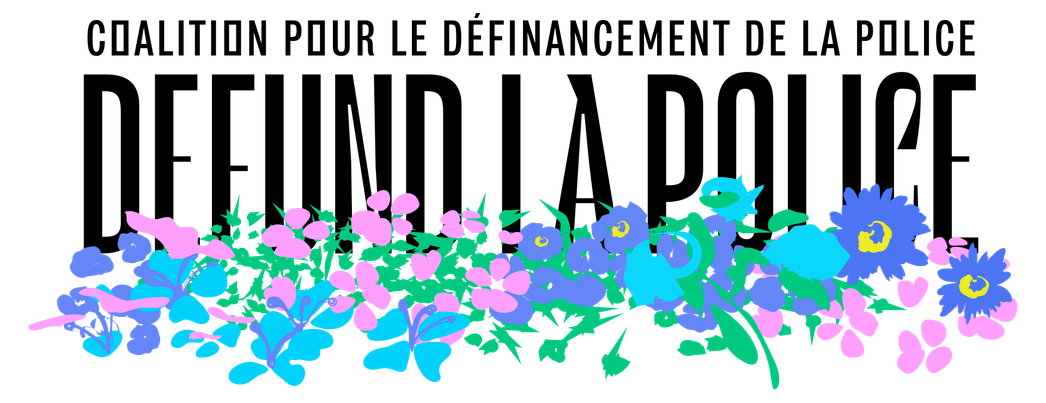Bilingual Ep 0: Abolir c'est créer / Abolition is creation
[00:00]
BBC: Cities across the United States remain in a state of high tension tonight as the country braces itself for another wave of protest over the death of George Floyd.
Radio Canada: Les vies des noir content, Montreal continue elle aussi a le répéter.
Global News: We begin in New Brunswick where for the second time this month, police have shot and killed an Indigenous person.
Reporter: A call to cut the Montreal Police’s annual budget of 662 million dollars right in half. This was the message of the protest.
Speaker: Marginalised communities that need services. That is the new common sense revolution. And we need to keep in the streets until it’s realised.
Protesters: No Justice. No Peace. Defund La Police.
[01:00]
Alia: In the wake of these global protests, community members came together to form a Defund The Police Coalition in Montreal. The mission was simple: defund the police and invest in community care and safety.
Karl : À la suite de ces manifestations mondiales, les membres de la communauté se sont réunis pour former la Coalition pour le définancement de la police. La mission était simple: définancer la police et investir dans des approches communautaires pour la sécurité publique.
Alia: Three years later, as major cities across Canada continue to increase police budgets, the fight is more urgent than ever. Montreal is facing numerous public safety crises, as social inequities deepen.
Karl: Trois ans plus tard, les revendications de la Coalition pour le définancement de la police sont plus actuelles que jamais, alors que la ville de Montréal fait face à différentes crises qui exacerbent les injustices.
Alia: Today, the Defund the Police coalition brings together over 80 member organisations and hundreds of activists who are fighting to create new visions and practices of collective safety in Montreal.
Karl: Aujourd'hui, la Coalition pour le définancement de la police réunit 80 organismes montréalais et des centaines d’activistes qui luttent pour réaliser une vision alternative de notre sécurité collective.
[02:06]
Alia: You’re listening to Brûler Bâtir.
Karl: Un nouveau podcast mensuel bilingue de la Defund Coalition.
Alia: I’m Alia.
Karl: J’suis Karl
Alia: And we’ll be your hosts.
[02:20]
Alia: So often, conversations around defunding are framed as negative calls to action that seek to take away or destroy.
Karl: Toutefois, les appels au définancement sont ancrés dans la reconnaissance que la sécurité des individus est créée à travers des organisations de soins qui s’attaquent aux sources des problèmes que vivent les individus en répondant à leurs besoins réels.
Alia: The carceral systems that currently claim to provide “public safety” are based in logics of punishment and fear that on the contrary are themselves major sources of harm and violence that create an infinite cycle of injustice and criminalization.
Karl: Transformer la manière dont nous adressons la violence et les torts peut sembler comme très ambitieux. Mais ces réponses communautaires existent déjà partout autour de nous, elles sont souvent méconnues, et elles pourraient tellement être mieux utilisées si elles étaient mieux financées.
Alia: We want to showcase this work, with all its challenges and triumphs right here, where we are, in Montreal. In doing so, we want to emphasise the generative and reconstructive dimension of defunding campaigns.
Karl: La lutte n'est pas juste d'abolir certaines choses, mais surtout de créer des nouvelles réponses qui vont rendre désuète la police, les prisons et les institutions de contrôle.
Alia: Alongside activist Mariame Kaba we want to begin with the question “What [else] can we imagine for ourselves and the world?”
[03:47]
Alia: Hi Karl!
Karl: Allô Alia
Alia: Usually we’re gonna be interviewing other people together. But today to get things started we’re gonna interview each other together.
Karl: Tout d’abord je veux dire merci de m’avoir rejoint pour ce projet-la. J’suis vraiment heureux d'y participer. Pis vraiment excité des personnes qu’on va interviewer. Pis de comment le projet se part jusqu'à maintenant. Qu’est-ce qui t'as poussée à mettre le projet sur pied? C’est quoi ta vision?
Alia: There were a few intertwining motivations for this project. I organise with the Defund Coalition. I mostly do work with the communications team. And at the time a lot of the work we were doing was focused on researching and exposing the violence and harm of police operations around the city. And there was kind of talk about putting forth a project that centred a little more of the hopeful and generative side of defunding demands. We’d heard of the One Million Experiments Project that takes place in the States and we thought they had a really exciting model for doing this sort of imaginative abolitionist work.
So after many months of thinking and planning we put together this team and here we are. And when we talked about finding hosts for this project your name just kind of came up and I kind of cold emailed you. So I guess I’m kind of curious about what made you decide to join the project?
Karl: Je me souviens exactement du moment où j'ai vu ton message. Pis j’étais, genre, oh so nice! Je m'étais coupée de la civilisation pendant une semaine et demi, j’étais sur un voilier. Et plus, en ce moment-là j'étais comme je veux me réimpliquer. Je veux revenir dans la mobilisation. Faque c’est quand même perfect timing. Puis le projet me tentait vraiment, comment on avait le goût de discuter, de faire un porte-voix des idées de la campagne pour le définancement de la police, puis comment les intervenants vivent ça. Puis, je pensais à quelque chose qui me rejoint dans mon militantisme personnel: de parler à des personnes qui ne sont pas nécessairement d'accord avec les idées par rapport à définancer la police ou réimaginer les soins, et je voyais que le projet pouvait mener à ça. Montrer que c'est pas juste théorique, utopique, mais que c'est des alternatives concrètes qui existent déjà. Puis que c'est de construire les systèmes alternatifs, de penser au soutien pour tout le monde. Voilà, c'est ça qui me parlait. On a un peu effleuré les thématiques de "l'abolition" jusqu'à présent, sans nécessairement le nommer – mais on veut le nommer abolition. Puis je me demandais, comment t'avais entendu parler la première fois de l’abolitionnisme? Pis qu'est ce que ça veut dire pour toi aujourd'hui?
Alia: I don't know that I remember like the first time I heard the word abolition. But it was definitely during 2020 and the Black Lives Matter Protests that I really started to bring abolition into a more foundational framework of how I think about politics in general. For me, it's really about reinvesting and creating an economy of care over an economy of punishment and violence, and so we're using the words like defund or abolish, which are kind of destructive words, but it's really about what happens as you do that, which is always a re-making or a funding of other things. And so on one hand, this political framework structurally requires organising and fighting for the creation and maintenance of places that provide meaningful support and care for our communities which is a really wide ranging list of demands. Then it also has this more personal everyday dimension where it speaks to the ways we show up in our interpersonal relationships and how we relate to people and care for them. I think of this as a motion that constantly requires labour and energy and struggle: trying and then trying again when we fail. What about you Karl? Do you remember when that word came into your life and what does it mean to you today?
Karl: Et oui, ben c'est intéressant que tu parles de 2020. Puis je pense que 2020, ça a été un turning point qui a exposé la violence policière, puis de la voir se déployer. En 2020, j'étais intervenant dans la rue auprès des personnes qui sont impliquées dans l'industrie du sex. Puis pendant la crise de santé publique, c'est juste devenu comme ça n'avait pas de sens comment notre travail était directement en contradiction avec celui de la police. Pour aider, pour mettre en place les interventions auprès des personnes, il fallait toujours calculer qu'est ce que la police va faire? Qu'est ce que la police va contrecarrer? Puis en 2020, à Carlton ils ont aboli les stages dans la police à l'école des criminologies. Puis ça faisait vraiment écho avec moi où j'étais rendu dans mon parcours où j'avais à choisir un stage professionnel puis la recherche. Puis j'ai été plus sans recherche finalement. Puis j'ai fait justement mon mémoire sur des intervenants dans le contexte de la crise de COVID, comment il négociait le travail avec la police. Puis j’ai entendu des dizaines et dizaines de témoignages de comment la police était comme une complication dans le travail des intervenants. Enfin, je dirais que c'est là que ça s'est cristallisé comment la police ne peut pas être une source de soins. Puis elle ne peut pas prendre soin des communautés marginalisées. Puis elle fait juste amplifier les problèmes. Pour revenir peut être à ce que tu as mentionné aussi pour l'éthique personnelle. Je pense que les abolitionnistes nous invitent à ne pas utiliser la théorie abolitionniste juste d'un point de vue théorique, mais à ce que ça devienne comme une éthique personnelle de vie. Puis il y a des abolitionnistes, justement, qui nous rappellent qu'on peut pas, d'un côté plaider pour l'abolition, puis de l'autre agir dans des logiques punitives. Comment on arrive dans nos relations, puis comment on répond à ce qui nous blesse, puis quand on blesse les autres. Fait que c'est un peu comme la manière de vivre sa vie, puis d'appartenir à une communauté, de travailler avec la communauté. Donc moi je pense que nos parcours font quand même écho sur l'importance de l'abolition dans nos vies, puis aussi dans notre parcours plus intellectuel.
Alia: Yeah, it's interesting how you speak about your experience of 2020 as a time where a lot of these ideas felt they had the potential to be really transformative. Part of the motivation for this podcast was remembering how in 2020 these abolitionist ideas felt mainstream and how many people, for the first time, were behind ideas about defunding. Since then some of that hope of systemic change has felt farther away and so part of the idea of this podcast was to bring some of that energy and really practical work back into view.
Karl: Puis ça fait Mariame Kaba who says: Hope is a Discipline.
Alia: Yes, hope is a discipline and I hope we can kind of keep this sentiment alive throughout our interviews. For me, at their strongest, articulations of abolition aren't abstract or distant political projects, but are things that have stakes for how we understand ourselves and the ways we navigate all of our relationships and it's also a politics that is alive and open to transformation and criticism. I think as these ideas come more into the mainstream, or at least get funded, we are always negotiating what these things mean. Figuring out how to transform harm is not simple and the answers are not fixed or always present the first time. I guess that's a nice segway into our last question, which speaks about this transformation, riffs off the name of our podcast, and the spirit we really want to bring to these conversations namely that defunding work is a twofold commitment of undoing carceral structures and formulating alternative social relationships, which are detached from these institutions. So the question is: what carceral system or structure do you want to burn down, and what would you like to build up in its place?
Karl: Je pense que si on entrevoit l'abolition comme un horizon sur lequel il faut s'engager, puis tout en suivant aussi les propositions qui nous disent de penser à des réformes non-réformistes, donc on peut élargir la carcéralité ou travailler à la diminuer vers le projet final qui est d'abolir. Je pense que ça serait vraiment important de se défaire de notre tendance punitive des 40 dernières années à faire entrer progressivement les logiques de contrôle et de surveillance dans les services sociaux, donc de revenir à un travail social qui se focus vraiment sur les soins. Puis, toi Alia?
Alia: I've been thinking a lot about the nation state and colonial borders, because of the genocide that's going on in Gaza and this illusion of military-backed borders, being a sense of safety. Borders are themselves violent and often create this false sense of peace in the lives of some at the expense of others. And there's this illusion that people’s safety is in competition, that the safety of the Israeli people requires constant violence against Palestinians. An abolitionist lens would emphasize how everyone’s safety is actually connected. One of the biggest lies of the colonial state has been to convince people that that's not the case. And then, a more ground thing we can build that gives me a sense of joy and safety in my life is spaces where I can feel connected and in community with my neighbours, even my neighbours who I don't know, who are very different from me. For me, that's the coffee shop that I go to down the street and like there's a bunch of people with ranging ages and backgrounds that I have come to know and talk to. I'm a grad student and some of the research I do is on these kinds of third spaces or community spaces, and I think of them as sites where solidarity and meaningful recognition of people's needs are possible. So I'm kind of thinking about those two things which are in some ways really not related, but I think in other ways quite connected.
Karl: We should go to that coffee down the street! I’d be interested. Merci, Alia pour ce premier épisode. Je pense que ça fait une petite présentation de qui on est. Notre lien avec la coalition Defund.
Alia: Thanks for being here and also for, you know, all the work that's gone in making this possible. And also we should just thank our team, too, who has helped us think through these ideas and continues to do a lot of work behind the scenes.
[13:52]
Alia: Thanks for chatting Karl.
Karl: Merci Alia à plus tard.
[14:43]
Karl: Brûler Bâtir est un projet réalisé par Alia, Karl, Abby, Zo, and Orlando.
Alia: Our outro song is by Kimmortel off their new album Shoebox and is linked in the show notes where you can find a full transcript of the episode in English and French. We do this work in Tiohtià:ke on the unceded lands of the Kanien'kehá:ka.
Karl: Abonnez-vous au podcast et partagez! Merci d’avoir été des nôtres et on se dit à la prochaine.






